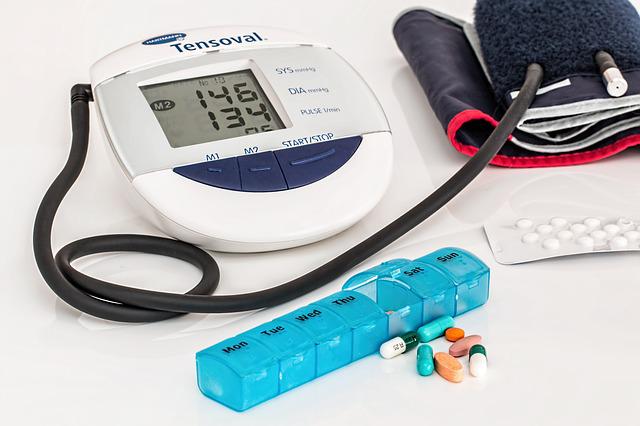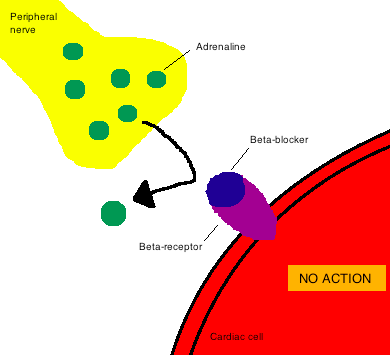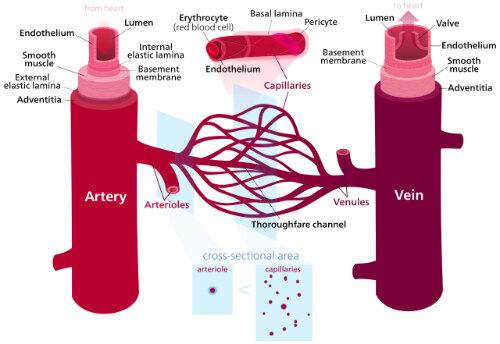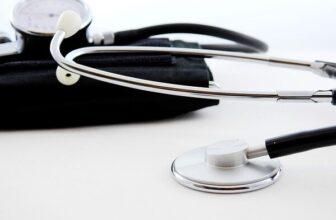
(Note: Some of the links in this post are affiliate links, and we will be compensated when you make a purchase by clicking through our links at no additional cost to you.)
Treatment for high blood pressure depends on the severity of the disease and whether you have other health problems such as heart failure or diabetes or you are pregnant. If your blood pressure is above a certain level, your physician may prescribe high blood pressure medication (antihypertensives) along with lifestyle changes.
Your physician and health care provider usually recommend lifestyle changes like changing your diet, weight loss and regular exercise as one of the first steps in treating mild to moderate high blood pressure or hypertension. These steps are highly effectively in reducing blood pressure. As we all know, this is easier to suggest than to achieve. It will take a dedicated effort to find time in our busy lives to exercise. One way to accomplish this increase in physical activity is to take the stairs instead of the elevator at work.
Discontinuing smoking does not directly reduce blood pressure but is very important for people with hypertension because it reduces the risk of many dangerous outcomes of hypertension such as stroke and heart attack.
Mild hypertension is usually treated by diet, exercise and improved physical fitness. A diet rich in fruits and vegetables and fat-free dairy foods low in fat and sodium lowers blood pressure in people.
>>> Discover The Top DASH Diet Cookbooks To Help Lower Your Blood Pressure
The only true way of ascertaining whether you have high blood pressure or not is by having it checked or monitored regularly using a home blood pressure monitor and tracking it with a blood pressure log. This is a painless procedure, and every adult should have their blood pressure checked regularly since your blood pressure can change over time. This way you are more likely to catch a change before it becomes dangerous. Ask your health care provider how often you need to check it.
What Is The Most Commonly Prescribed High Blood Pressure Medication?
Most patients with moderate or severe hypertension may end up requiring indefinite drug therapy to bring their blood pressure down to a safe level. Which type of high blood pressure (antihypertensives) medication to use initially for hypertension has been the subject of several large studies. Recent studies support that low‐dose thiazides should be used first for most patients with elevated blood pressure. Commonly used antihypertensives drugs are provided here. For your information and reference, we have included generic names as well as the common brand names noted in (). If your prescription medication isn’t on this list, remember that your physician and pharmacist are your best sources of information. It’s important to discuss all of the medications you take (including over-the-counter drugs and vitamins) with your health care providers and understand their desired effects and possible side effects. Please remember to never stop taking a medication and never change your dose or frequency without first consulting your prescribing physician.
Diuretics
Diuretics, also called water pills, help prevent retention of water by flushing out excess water and sodium from the body. Proper excretion of these elements in the urine helps alleviate congestion in the organs of the body such as the heart. There are three types of diuretics: Thiazide, Potassium-sparing and Loop.
Commonly prescribed diuretics (brand names):
Thiazide diuretics
- chlorthalidone (Hygroton)
- chlorothiazide (Diuril)
- hydrochlorothiazide (Esidrix, Hydrodiuril, Microzide)
- indapamide (Lozol)
- metolazone (Mykrox, Zaroxolyn)
Potassium-sparing diuretics
- amiloride hydrochloride (Midamor)
- spironolactone (Aldactone)
- triamterene (Dyrenium)
- eplerenone (Inspra)
Loop diuretics
- furosemide (Lasix)
- bumetanide (Bumex)
- ethacrynic acid (Edecrin)
- torsemide (Soaanz)
Combination diuretics
- amiloride hydrochloride + hydrochlorothiazide (Moduretic)
- spironolactone + hydrochlorothiazide (Aldactazide)
- triamterene + hydrochlorothiazide (Dyazide, Maxzide)
Diuretics are generally safe. Possible side effects from diuretics:
- Increased urination and sodium loss.
- Diuretics can also affect blood potassium levels. If you take a thiazide diuretic, your potassium level can drop too low (hypokalemia), which can cause life-threatening problems with your heartbeat. Symptoms such as weakness, leg cramps or being tired may result. Eating foods containing potassium may help prevent significant potassium loss. If you’re on a potassium-sparing diuretic, you can have too much potassium in your blood.
- Dizziness
- Headaches
- Dehydration
- Joint disorders (gout)
- Impotence
Beta-Blockers
Beta-blockers decrease nerve signals to the heart and blood vessels, thus reducing the number of heart beats and lessening the force of contraction of the cardiac muscle. As the heart works less hard, the blood pressure drops.

Commonly prescribed beta-blockers (brand names):
- acebutolol (Sectral)
- atenolol (Tenormin)
- betaxolol (Kerlone)
- bisoprolol fumarate (Zebeta)
- carteolol hydrochloride (Cartrol)
- metoprolol tartrate (Lopressor)
- metoprolol succinate (Toprol-XL)
- nadolol (Corgard)
- penbutolol sulfate (Levatol)
- pindolol (Visken)
- propranolol hydrochloride (Inderal)
- solotol hydrochloride (Betapace)
- timolol maleate (Blocadre)
Combination beta-blocker/diuretic
- hydrochlorothiazide and bisoprolol (Ziac)
Possible side effects from beta-blockers:
- Feeling tired, dizzy or lightheaded (these can be signs of a slow heart rate)
- Cold fingers or toes (beta blockers may affect the blood supply to your hands and feet)
- Difficulties sleeping or nightmares (Insomnia)
- Depression
- Shortness of breath
- In people who have diabetes, beta blockers may block signs of low blood sugar, such as rapid heartbeat. It’s important to check your blood sugar regularly if you have diabetes and you’re taking a beta blocker.
- If you have been prescribed beta-blockers, consult your healthcare provider if there is a chance you could become pregnant. If you discover that you are pregnant consult your physician as soon as possible to determine the safest medication for you at this time.
ACE Inhibitors
ACE stands for Angiotensin-converting enzyme. ACE inhibitors thwart the formation of angiotensin II, a hormone that narrows blood vessels. Drugs from this group relax the arteries and cause the blood pressure to go down. Angiotensin antagonists protect the blood vessels from angiotensin II.
Commonly prescribed ACE inhibitors (brand names):
- benazepril hydrochloride (Lotensin)
- captopril (Capoten)
- enalapril maleate (Vasotec)
- fosinopril sodium (Monopril)
- lisinopril (Prinivel, Zestril)
- moexipril (Univasc)
- perindopril (Aceon)
- quinapril hydrochloride (Accupril)
- ramipril (Altace)
- trandolapril (Mavik)
Possible side effects from ACE inhibitors:
- Chronic dry, hacking cough
- Increased potassium levels in the blood (hyperkalemia)
- Fatigue
- Dizziness from blood pressure going too low
- Headaches
- Loss of taste
- Skin rash
- In rare instances, kidney damage
- Taking ACE inhibitors during pregnancy increases the risk of birth defects in the baby. These drugs have been shown to be dangerous to both mother and baby during pregnancy. They can cause low blood pressure, severe kidney failure, excess potassium (hyperkalemia) and even death of the newborn. If you’re pregnant or plan to become pregnant, talk to your physician about other options to treat high blood pressure.
Calcium Channel Blockers
Calcium channel blockers prevent the influx of calcium into the heart muscle and blood vessels, relaxing the blood vessels and lowering their pressure.
Commonly prescribed calcium channel blockers (brand names):
- amlodipine besylate (Norvasc, Lotrel)
- bepridil (Vasocor)
- diltiazem hydrochloride (Cardizem CD, Cardizem SR, Dilacor XR, Tiazac)
- felodipine (Plendil)
- isradipine (DynaCirc, DynaCirc CR)
- nicardipine (Cardene SR)
- nifedipine (Adalat CC, Procardia XL)
- nisoldipine (Sular)
- verapamil hydrochloride (Calan SR, Covera HS, Isoptin SR, Verelan)
Possible side effects from Calcium Channel Blockers:
- Constipation
- Dizziness
- Fast heartbeat (tachycardia – heart over over 100 beats per minute)
- Heart palpitations (your heart is beating too hard or too fast, skipping a beat, fluttering or pounding heart)
- Fatigue
- Flushing
- Headache
- Nausea
- Rash
- Swelling in the feet and lower legs
Alpha-Blockers
Alpha-blockers prevents a hormone called norepinephrine from tightening the muscles in the walls of arteries, allowing easier passage of blood and causing the blood pressure to go down. Alpha-beta blockers, on the other hand, have the same effect with the addition of slowing the heart beat, thus lowering the blood pressure. Nervous system inhibitors control nerve impulses in the blood vessels, relaxing them and lowering their pressure.

Commonly prescribed Alpha-blockers (brand names):
- doxazosin mesylate (Cardura)
- prazosin hydrochloride (Minipress)
- terazosin hydrochloride (Hytrin)
Combined alpha and beta-blockers (Alpha-beta blockers)
- carvedilol (Coreg)
- labetalol hydrochloride (Normodyne, Trandate)
Possible side effects from Alpha-blockers:
- A drop in blood pressure when you stand up (postural hypotension)
- Fast heart rate (tachycardia – heart over over 100 beats per minute)
- Dizziness
- Rarely, they may cause problems with erections in men
- Swollen legs or ankles (peripheral edema)
Vasodilators
Vasodilators or blood vessel dilators lower the blood pressure as they cause the blood vessels to dilate.
Commonly prescribed Vasodilators (brand names):
- hydralazine hydrochloride (Apresoline)
- minoxidil (Loniten)
Possible side effects from Vasodilators:
- Rapid heartbeat (tachycardia)
- Heart palpitations (your heart is beating too hard or too fast, skipping a beat, fluttering or pounding heart)
- Swollen feet or ankles (edema) or weight gain, caused by fluid retention
- Nausea
- Vomiting
- Headache
- Excessive hair growth
- Joint or muscle pain
- Chest pain
- Blocked nose
- A drop in blood pressure when you stand up (postural hypotension)
Angiotensin II Receptor Blockers (ARBs)
Angiotensin II receptor blockers (ARBs) have similar effects as ACE inhibitors. They help relax your veins and arteries to lower your blood pressure by blocking the action of angiotensin II, a hormone that narrows blood vessels. ARBs are usually prescribed for individuals who can not tolerate ACE inhibitors.
Commonly prescribed Angiotensin II Receptor Blockers (ARBs) (brand names):
- candesartan (Atacand)
- eprosartan mesylate (Teveten)
- irbesarten (Avapro)
- losartan potassium (Cozaar)
- telmisartan (Micardis)
- valsartan (Diovan)
Possible side effects from Angiotensin II Receptor Blockers (ARBs):
- Dizziness
- Higher than normal potassium levels in the blood (hyperkalemia)
- Swelling of the skin due to a buildup of fluid (angioedema)
- Cough, though less commonly than with ACE inhibitors.
- ARBs should not be used if you are or planning to be pregnant. Medications that act directly on the renin-angiotensin system can cause injury or even death to a developing fetus.
Central Alpha Agonists
Central Alpha Agonists lower your blood pressure by blocking signals from the brain to the nervous system that increase the heart rate and narrow blood vessels.
Commonly prescribed Central Alpha Agonists (brand names):
- alpha methyldopa (Aldomet)
- clonidine hydrochloride (Catapres)
- guanabenz acetate (Wytensin)
- guanfacine hydrochloride (Tenex)
Possible side effects from Central Alpha Agonists:
- Slow heart rate
- Constipation
- Dizziness
- Drowsiness or sluggishness
- Dry mouth
- Fatigue
- Fever
- Headache
- Impotence
Medication Management
It is most important to take your medications as prescribed. It is also important to keep an accurate list of all medications you take, even those that don’t need a prescription. Medications for different problems may work against each other or may cause one medication to have a stronger effect on you. Both prescription and over-the-counter medications play a part in how well the heart performs. Sometimes the way they work together is planned, and sometimes they do not work well together. Here are 10 steps to make managing your blood pressure medications easier:
- Be sure to talk to your physician, nurse or pharmacist before you take any new medicine, including those you can buy over the counter, prescription drugs, vitamins, and herbs. Some of them can make your high blood pressure worse.
- Be sure to read the label on any over-the-counter medicine before you buy it. Many contain a lot of sodium.
- Avoid high sodium antacids and over-the-counter cold and sinus medicines. Ask your physician, pharmacist or nurse which over-the-counter medicines you can take.
- Take all medication your physician prescribed when you are supposed to.
- Know what side effects your medicine can have.
- Use a helpful reminder in an obvious place to remember to take your medicines.
- Do not take a medication prescribed for someone else.
- Remember to refill your medicine in a timely way. Make a note on the calendar each time you pick your medicine and write a note on the next day you need to order more.
- Use a pill minder or medication tracker to help you remember all medicine you are supposed to take.
- Have a friend/family member call you to remind you to take your medicines.
All information provided by HighBloodPressureHub.com is of a general nature and is furnished for educational purposes only. You should not rely on this information as a substitute for, nor does it replace, professional medical advice, diagnosis, or treatment. If you have any concerns or questions about your health, you should always consult with a physician or other health-care professional. Do not disregard, avoid or delay obtaining medical or health related advice from your health-care professional because of something you may have read on this site. YOU ARE ENCOURAGED TO CONFER WITH YOUR PHYSICIAN OR HEALTHCARE PROVIDER WITH REGARD TO INFORMATION CONTAINED ON OR THROUGH THIS WEB SITE. AFTER READING ARTICLES OR OTHER CONTENT FROM THIS WEB SITE, YOU ARE ENCOURAGED TO REVIEW THE INFORMATION CAREFULLY WITH YOUR PROFESSIONAL HEALTHCARE PROVIDER. The use of any information provided on this site is solely at your own risk.







